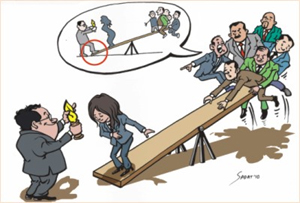Mamun Rashid
 I recently wrote a piece for The Daily Star business section on our lady colleagues. As usual, I received a few e-mails and phone calls. One of them was from a younger friend of mine, working for a regional conglomerate. He thought I did not do enough justice to the male colleagues, while championing the cause of our lady colleagues.
I recently wrote a piece for The Daily Star business section on our lady colleagues. As usual, I received a few e-mails and phone calls. One of them was from a younger friend of mine, working for a regional conglomerate. He thought I did not do enough justice to the male colleagues, while championing the cause of our lady colleagues.
He felt there are plenty of male colleagues who help the women in the office excel and find a good balance between work and personal life. There are plenty of organisations too that promote diversity at the workplace.
There is always a next time. Since then, I have been thinking out loud. At times, I find myself in a dilemma over the critical situations at the workplace. Somehow, I have my own way of facing double-edged swords that arise in the cut-throat corporate world every day.
Over the last couple of days, I have been thinking whether the ironical situations surround working women more? How does it affect their male co-workers, other female co-workers or the boss?
In Bangladesh, a woman’s involvement in any controversy increases the overall sensitivity of the situation. The reason is understandable. We have seen the rise of working women over the last 15 years. Men have been on the job for 30 years in the men-only-workplace. Terms such as ‘workplace harassment’ or ‘not suitable for work’ are new to us.
Let’s face it. We are learning those from the western world. But something must be going wrong. Otherwise, what is the explanation behind only 15 ‘Fortune 500’ companies being run by women, whereas women make up more than half of America’s labour force?
Let me explain a bit where the dilemma comes from. Suppose you are the line manager of a young executive. Incidentally, she is female, although that has nothing to do with her job description and role definition. You promote her over her male co-worker strictly based on quantifiable performance measures, like faster delivery, higher revenue, and more client acquisition. You are content with yourself because you have not committed the crime of ‘gender discrimination’ against women. The young executive’s job satisfaction has also gone up because she has been duly rewarded for her contribution to the organisation.
But interpretation from the other end is completely different. You receive vibes from the male co-workers that they do not have a future in this company just because they are not ‘young and pretty’! The interpretation could be worse — ‘the boss promoted her only because he is sympathetic to the not-so-efficient and absorbed-with-family-problems women employees”! Believe you me, some people will go a long way before they admit even to themselves that the female executive has actually out-performed them in terms of pure work.
What does it matter, what other people are thinking as long as there has been no gender discrimination and the performance appraisal was fair? It matters because there are consequences. These types of misinterpretations, in the long run, may discourage the line manager to promote female executives in fear of denting his reputation.
The opposite scenario also exists. You have not promoted the female executive because she had not met her deliverables within deadline. Now she goes about telling everyone that she has been gender-discriminated. Getting into a word-of-mouth war does not really help your case.
Survey results suggest that historically, organisational culture had been more important to women than men in making career decisions. While men switched their jobs for a fatter bonus, women switched jobs to become part of a better culture or working environment.
The problem lies with people’s mindset; it is just reflected through stereotyping behaviour. The solution lies in changing attitude. Think of it this way — person A was promoted due to his/her performance over person B. Whether person A is female or male is an irrelevant piece of information when it comes to performance appraisal and decision making. When you walk through the door of your organisation in the morning, think of yourself as an executive, nothing more and definitely nothing less.
I am not a believer of giving extra support to women at work. I believe they are capable of taking care of themselves. My point is and was that women should not be forced to overcome more obstacles in reaching the top than others.
Misinterpretations should not be allowed to get in the way of the positive rise of working-women in our country. Fear of a loss of reputation should also not make line managers under-reward them. We need more line managers and bosses like my young friend to promote the causes of women and encourage them to put in their best.
We are learning fast. We have adapted surprisingly well to the new workplace culture of diversity and accepted the female presence with warm regards. Let’s not pay lip service to equality and diversity. The satisfied female executives and the management profile will speak for the organisation on their own.
The writer is a banker and economic analyst. He can be reached at: mrashid1961@gmail.com







